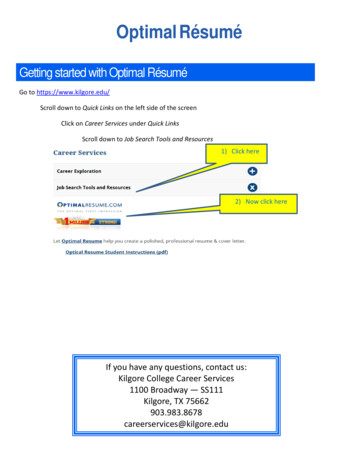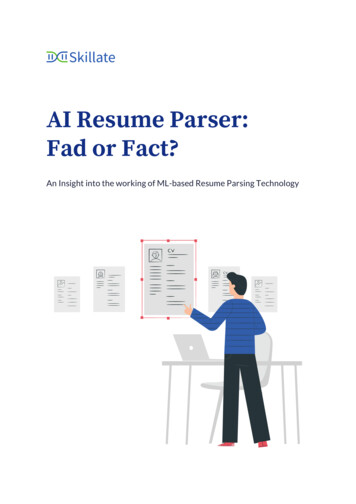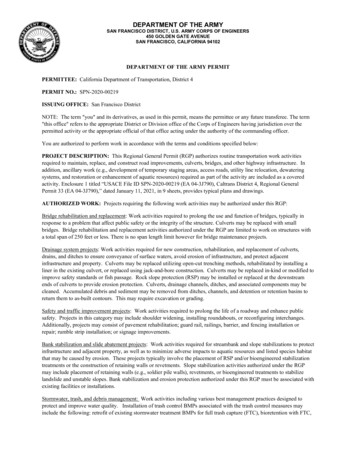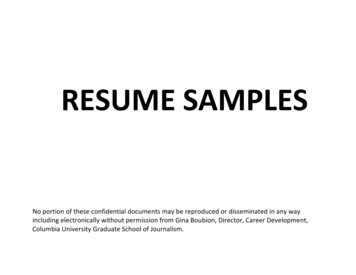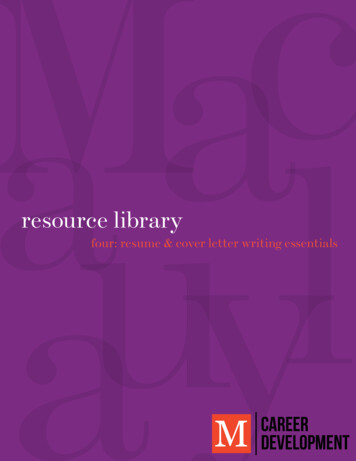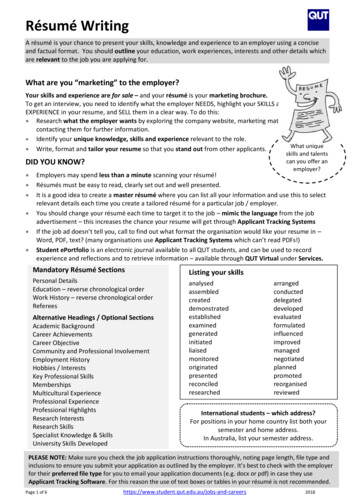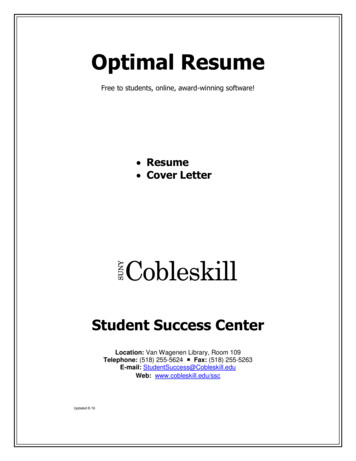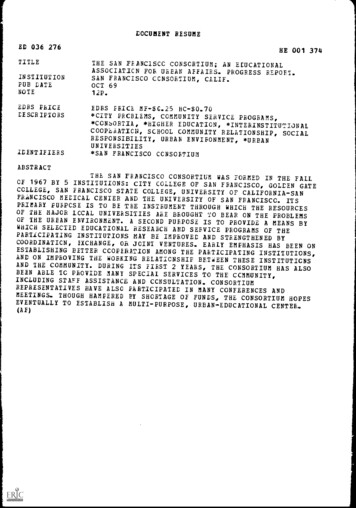
Transcription
DOCUMENT RESUMEED 036 276TITLEINSTITUTIONPUB DATENOTEEDRS PRICEDESCRIPTORSIDENTIFIERSHE 001 374THE SAN FRANCISCO CONSORTIUM; AN EDUCATIONALASSOCIATION FOE URBAN AFFAIRS. PROGRESS REPOFT.SAN FRANCISCO CONSORTIUM, CALIF.OCT 6912P.EDRS PRICE MF- C.25 HC- 0.70*CITY PRCBLEMS, COMMUNITY SERVICE PROGRAMS,*CONSORTIA, *HIGHER EDUCATION, *INTERINSTITUTIONALCOOPERATION, SCHOOL COMMUNITY RELATIONSHIP, SOCIALRESPONSIBILITY, URBAN ENVIRONMENT, *URBANUNIVERSITIES*SAN FRANCISCO CONSORTIUMABSTRACTTHE SAN FRANCISCO CONSORTIUM WAS FORMED IN THE FALLOF 1967 BY 5 INSTITUTIONS: CITY COLLEGE OF SAN FRANCISCO, GOLDEN GATECOLLEGE, SAN FRANCISCO STATE COLLEGE, UNIVERSITY OF CALIFORNIA-SANFRANCISCO MEDICAL CENIER AND THE UNIVERSITY OF SAN FRANCISCO. ITSPRIMARY PURPOSE IS TO BE THE INSTRUMENT THROUGH WHICH THE RESOURCESOF THE MAJOR LOCAL UNIVERSITIES ARE BROUGHT TO BEAR ON THE PROBLEMSOF THE URBAN ENVIRONMENT. A SECOND PURPOSE IS TO PROVIDE A MEANS BYWHICH SELECTED EDUCATIONAL RESEARCH AND SERVICE PROGRAMS OF THEPARTICIPATING INSTITUTIONS MAY BE IMPROVED AND STRENGTHENED BYCOORDINATION, EXCHANGE, OR JOINT VENTURES. EARLY EMPHASIS HAS BEEN ONESTABLISHING BITTER COOPERATION AMONG THE PARTICIPATING INSTITUTIONS,AND ON IMPROVING THE WORKING RELATIONSHIP BETWEEN THESE INSTITUTIONSAND THE COMMUNITY. DURING ITS FIRST 2 YEARS, THE CONSORTIUM HAS ALSOBEEN ABLE TO PROVIDE 3ANY SPECIAL SERVICES TO THE CCMMUNITY,INCLUDING STAFF ASSISTANCE AND CONSULTATION. CONSORTIUMREPRESENTATIVES HAVE ALSO PARTICIPATED IN MANY CONFERENCES ANDMEETINGS. THOUGH HAMPERED BY SHORTAGE OF FUNDS4 THE CONSORTIUM HOPESEVENTUALLY TO ESTABLISH A MULTI-PURPOSE, URBAN-EDUCATIONAL CENTER.(AF)
THE SAN FRANCISCO CONSORTIUMAn Educational Association for Urban AffairsPROGRESSREPORTU S. DEPARTMENT OF HEALTH. EDUCATION i WELFAREOFFICE OF EDUCATIONTHIS DOCUMENT HAS SEEN REPRODUCED EXACTLY AS RECEIVED FROM THE7PERSON OR ORGANIZATION ORIGINITING IT.POINTS Of VIEW OR OPINIONSSTATED DO NOT NECESSARILY REPRESENT OFFICIAL OFFICE OF EDUCATIONPOSITION OR POLICYOCTOBER 1969
BOARD OF TRUSTEESex-officio:Louis G. Con lan, PresidentCity College of San FranciscoS. L Hayakawa, PresidentSan Francisco State CollegeRev. Albert R. Jonsen, S.J.PresidentUniversity of San FranciscoDaniel D. FederDean, Academic PlanningSan Francisco State CollegeAlvin I. FineDepartment of HumanitiesSan Francisco State CollegeCharles J. MarshAcademic Vice PresidentGolden Gate CollegeRev. Timothy L. McDonnell, S.J.Philip R. Lee, M.D.,ChancellorUniversity of CaliforniaSan Francisco Medical CenterRussell T. SharpePresidentSpecial Assistant to the PresidentUniversity of San FranciscoThomas NesbittDean of InstructionCity College of San FranciscoGolden Gate CollegeJohn M. SeligMalcolm S. M. Watts, M.D., ChairmanDepartment of Political ScienceCity College of San FranciscoSpecial Assistant to the ChancellorUniversity of CaliforniaSan Francisco Medical CenterParticipating InstitutionsCity College of San FranciscoJ. Lath BaderDean, College of LawGolden Gate CollegeLt:-.:lie L. Bennett, M.D.Golden Gate CollegeSan Francisco State CollegeUniversity of CaliforniaVice Chancellor, Academic AffairsSan Francisco Medical CenterUniversity of CaliforniaSan Francisco Medical CenterUniversity of San FranciscoJack H. CurtisDepartment of SociologyUniversity of San FranciscoExecutive DirectorEdgar C. Cumings
4,11N.SAN FRANCISCO CONSORTIUMMI.0PROGRESS REPORTcoHistory and DevelopmentteNcmLliThe San Francisco Consortium is one of a growing number of metropolitan consortia or associations of institutions of higher educationthroughout the nation. It differs somewhat from most other consortia,however, in its primary emphasis on urban problems and in relating themajor institutions of higher education in San Francisco more closely toeach other and to the community. From the outset, therefore, the Con-sortium has emphasized not only inter-institutional cooperation, butalso community involvement.The initial discussions concerning the need for greater coordination in and concern for urban affairs on the part of San Francisco'seducational institutions occurred in 1966, when a small group of educators held a series of meetings to discuss plans for the establishment ofa formal educational association. A compelling factor was the growingeducational needs of disadvantaged and minority students in the city'scolleges and universities, with all of the attendant problems and challenges.Out of this background of study and discussion the San FranciscoConsortium was created and formally announced by the heads of thefive institutions in the fall of 1967. Steps were taken immediately toincorporate the Consortium as a non-profit educational association, andto secure funds in order to support its early development.Much credit is due the five individuals who were active from thebeginning in establishing the Consortium, and who may therefore beregarded as the "founding fathers." These are Malcolm S. M. Watts,M.D., present chairman of the Board of -Trustees; Jack H. Curtis,Ph.D., of the University of San Francisco; Thomas Nesbitt, Dean ofInstruction at City College of San Francisco; Cyril Roseman, Ph.D.,San Francisco State College; and Alfred 1. Silbowitz, Director of General Studies, Golden Gate College.On December 1, 1967 the Consortium received an initial grant of 24,000.00 from the San Francisco Foundation for the purpose offinancing its beginning operations. Offices were established, an admin-istrative assistant was employed, and Dr. Jack H. Curtis, one of thefounders, agreed to act as a volunteer, part-time executive secretaryuntil such time as the Consortium could afford to employ a full-timedirector.1
On February 1, 1968 Professor Alvin 1. Fine, a member of theDepartment of Humanities at San Francisco State College, agreed totake a leave of absence in order to become the Consortium's first fulltime executive director. Mr. Fine served in this capacity with distinction until June 30, 1969, at which time he decided to return to his former position. After interviewing a number of candidates for the vacantposition, the Board of Trustees selected Dr. Edgar C. Cumings as thenew executive director. Dr. Cumings came to the Conscrtium from abackground that included college teaching and administration, togetherwith several years of experience in community organization.The San Francisco Consortium is probably unique in the variety ofeducational programs represented by its participating institutions.These include a private community college, a state college, a privateCatholic university, a public city college, and an unusually diversestate-supported medical center comprised of professional schools ofmedicine, dentistry, nursing and pharmacy, with an academic schoolof human biology soon to be added. Plans are now being considered forenlarging the Consortium by the inclusion of several more San Francisco institutions.The Consortium continued to receive excellent support from otherlocal foundations during this early period of operation. The San Francisco Foundation made a second grant in the amount of 39.671.00 ; theS. H. Cowell Foundation allocated 29,615.00 ; and the Van Loben SelsFoundation contributed 15,000.00.During the spring and summer of 1969 the Board of Trusteesbegan to explore the possibility of obtaining contributions from theConsortium's participating institutions. By autumn of 1969 all fiveinstitutions had made financial commitments to the operating budget.Efforts to solicit additional contributions from a number of local foundations were also begun.During the developmental stage of the Consortium's existence majorefforts were devoted to establishing an effective organizational structure. The Board of Trustees was soon enlarged in order to providebetter institutional representation, including the five presidents, a Community Advisory Committee was assembled, several standing committees invol ing staff and faculty members from the member institutionswere formed, and various ad hoc groups were greated in order to study.special needs and problems.In addition to the inter-campus and inter-community structure, theConsortium developed good working relationships with a wide rangeof private and public agencies concerned with education and urbanproblems.2
MAJOR OBJECTIVES"The primary purpose of the Consortium is to become the instrument through which the resources of the major educational institutionsare brought more effectively to bear upon the unsolved problems of themodern urban environment. A second purpose is to provide a means bywhich selected educational research and service programs of the participating institutions may be improved and strengthened by appropriate coordination, exchange, or joint ventures. . ."This statement, written by Malcolm S. M. Watts, M.D., chairmanof the Board of Trustees, sums up the two chief objectives of the Consortium. It reflects a long-felt need in San Francisco for inter-institutional cooperation, as well as for a central resource for coordination andinformation. The usefulness of college and university-sponsored centersof urban affairs has been demonstrated in many parts of the countryduring the past decade.The early emphasis of the Consortium was on two aspects : Theestablishment of better cooperation and communication among the participating institutions; and the improvement of working relationshipsbetween these institutions and the community.Longer-range goals include closer coordination of current institutional programs in urban and minority areas; the establishment of aresource or data bank devoted to urban needs and problems ; direct services to the community in identirying needs and existing resources; thedevelopment and evaluation of practical programs to deal with thesematters ; and the ultimate establishment of the Consortium as a multipurpose center for a number of educational, cultural and civic activities.In order to accomplish these objectives, it is evident that the original institutional commitments in terms of staff and financial supportwill have to be continued and strengthened. A recent study has indicated that a period of from three ' ., five years is required in order todevelop the full potential of most consortia or associations of highereducation. Moreover, much effort will have to be made to obtain grantsfrom some of the larger foundations for special projects requiring moresubstantial funding. Several such proposals are now under way.PROGRAMS AND ACTIVITIESWhile much of the early emphasis of the Consortium's work had tobe placed on the establishment of communication systems among theparticipating institutions, nevertheless many different kinds of activi-ties have been developed since the first paid executive director tookoffice in February of 1968. A representative sample of these activitiesis described in the following sections.3
Standing CommitteesI.Educational Opportunity and Career Development Committee:Jefferson Davis, Professor of Chemistry and EOP Director, Univer-sity of San FranciscoWallace Epstein, M.D., Chairman, Senate Committee on EducationPolicy, U.C. Medical CenterHenry Evers, Community Advisory CommitteeJules Fraden, Dean of Instruction, City College of San FranciscoLloyd D. Luckmann, Associate Dean, College of Liberal Arts, University of San FranciscoReginald Major, EOP Director, San Francisco State CollegeWilson Robinson, Vice Pre.ident for Student Affairs, Golden GateCollegeHoward Schoon, Counselor, City College of San FranciscoLeandro Soto, Community Advisory CommitteeTheodore Swenson, Dean of Students, U.C. Medical CenterYori Wada, Community Advisory CommitteeHoward Weddle, Professor of Health Education, San FranciscoState CollegeAlan S. Wong, Community Advisory CommitteeII. Committee on Continuing and Urban Education:Jack H. Aldridge, Assistant Dean of Instruction, City College ofSan FranciscoMrs. Robert G. Bull, Community Advisory CommitteeSeymour M. Farber, M.D., Dean of Educational Services, U.C.Medical CenterWilliam P. Golden, Director, Downtown Center and ExtensionDivision, San Francisco State CollegeZuretti L. Goosby, D.D.S., Community Advisory CommitteeShepard A. Insel, Dean of Educational Services, San FranciscoState CollegeHerold A. Korf, Associate Professor of Humanities, Golden GateCollegeRalph Lane, Professor of Sociology, University of San FranciscoMrs. Carl Livingston, Jr., Community Advisory Committee9
Mayor's office, the Board of Supervisors, and various other city andcounty officials on urban, social and educational needs. . The St. Francis Square Council received staff assistance andadvice from the Consortium in interviewing workers for a summer recreation program in San Francisco's Western Addition area. . The Consortium provided advice and counsel toward the establishment of the Greater Los Angeles Consortium, and also conferredwith officials of San Diego in connection with the establishment of aconsortium in that city. . As a matter of continuing policy, the Consortium regularly exchanges information on programs and activities with many other consortia and educational associations throughout the country. . Program materials and consultative aid were made available ona virtually daily basis to a number of educational institutions and community organizations concerning urban needs and problems. . The Consortium arranged several meetings with students andeducators .r the occasion of a visit to the United States by the DeputyMinister of Education of Sierra Leone. Consultative services were givento an official of the South Korean Government concerning the possibilityof establishing a consortium in Seoul. The Consortium assisted in distributing copies of the Report ofthe Kerner Commission on Civil Rights to a number of local schools andinstitutions of higher education. A local program involving the development of a work-studyproject for urban interns was coordinated by the Consortium, in co-operation with the New York Urban Corps.Conferences and Meetings . . . The Consortium regularly provided information concerning minority participants for many local meetings and conferences on educational and urban affairs. . A representative of the Consortium participated in the firstConference of Regional Consortia, sponsored by the Greater Los Angeles Consortium. The executive director participated in a number of meetingssponsored by the Bay Area Social Planning Council and maintainedactive liaison with the Council on a variety of community concerns. . The Consortium participated in a Bay Area Regional Conference on Urban Affairs sponsored by the University of California Extension Division.5
. The Consortium sponsored its first annual conference involvingits member institutions and various other civic organizations and individuals.RECENT ACTIVITIES. During the summer of 1969, as a partial solution to the urgentneeds of minority youth and organizations, the San Francisco Citizens'League sponsored the Summer Happen Thing, a project designed toobtain funding for a number of educational, recreational and trainingprojects which provided help to many groups. The Consortium was anactive participant in this emergency program, providing work-studystudents, office space for the program's staff, and serving as a vehiclefor transmitting more than 70,000.00 to the Citizens' League for usein the project. At the request of the Bayview-Hunter's Point Health Center'sstaff, the Consortium helped to arrange assistance from several of itsmember institutions to provide free courses in basic education for theCenter's health technicians. The Consortium is continuing to work withthis and other Hunter's Point organizations toward the eventual establishment of a community college in that area. The Consortium's executive director has actively participatedin plans of the Far West Laboratory for Research and Development forthe use of the former Woolworth Warehouse as a new San Franciscolocation for the Laboratory, and as an "Educational Development Center" for a number of community organizations. The executive director is also participating in a combined efforton the part of a number of northern California organizations to obtainfunding for the establishment of a Student Financial Aid Center forthe Bay Area counties and their educational institutions. The Centerwould provide direct grants and loans to college and university students. The Consortium's inter - institutional and community - relatedstructure has recently been strengthened as a result of a complete reor-ganization of its standing committees, together with plans to involvemembers of the Community Advisory Committee more closely in ongoing programs and activities. A quarterly Newsletter was inaugurated with the publicationof the initial edition in September of 1969. The Newsletter is distributed to a wide range of organizations and individuals in San Francisco,as well as to other consortia.EMERGING PLANSAs indicated earlier in this report, the Consortium has been inactual operation for less than two years. Despite the generous financial6
assistance prov'ded by several local foundations and by the participating institutions, the lack of more adequate funding for the developmentof special projects and programs for the solution of urgent urban andrelated problems has been a notable handicap. Consequently, nearly allof the activities mentioned in the foregoing sections of this report havebeen accomplished with minimal funds and, for the most part, with thevoluntary aid of many individuals and groups.During recent months, therefore, several steps have been taken bythe executive director and the Board of Trustees in order to assess theConsortium's major plans and objectives, with the goal of placing muchgreater emphasis on obtaining outside funding for special projects.It is evident that these efforts to obtain the required financial support must concentrate on inter-institutional projects which will help tosolve at least some of San Francisco's urban problems. Special programsand services for the assistance of more minority and disadvantaged stu-dents must also be established and financed. The Consortium mustassume a more active role in making inter-institutional cooperation andcoordination a reality in such areas as the provision of greater lateraland upward mobility for students, the establishment of curricular exchange programs, the development of additional cooperatively sharedand sponsored programs, and a number of related activities.The ultimate goal of the Consortium is the establishment of amulti-purpose, urban-educational facility located in central San Francisco. Such a facility, though it might be developed under the auspicesof one particular member institution, would provide a home for amultitude of educational and ancillary services that would help not onlyto coordinate inter-institutional programs, but would also provide manyservices which are not now available to the community and its organizations. Finally, the creation of this type of multi-purpose downtowncenter, jointly sponsored by five widely different institutions of highereducation, would represent a unique venture in this country and a modelfor other metropolitan centers which may well be developed in othercities in future years.The experiences of nearly all of the successful consortia in thecountry, and the early successes of the San Francisco Consortium areharbingers of many productive future years in developing new educational services and programs.7
Standing CommitteesI.Educational Opportunity and Career Development Committee:Jefferson Davis, Professor of Chemistry and EOP Director, Univer-sity of San FranciscoWallace Epstein, M.D., Chairman, Senate Committee on EducationPolicy, U.C. Medical CenterHenry Evers, Community Advisory CommitteeJules Fraden, Dean of Instruction, City College of San FranciscoLloyd D. Luckmann, Associate Dean, College of Liberal Arts, University of San FranciscoReginald Major, EOP Director, San Francisco State CollegeWilson Robinson, Vice Pre.!dent for Student Affairs, Golden GateCollegeHoward Schoon, Counselor, City College of San FranciscoLeandro Soto, Community Advisory CommitteeTheodore Swenson, Dean of Students, U.C. Medical CenterYori Wada, Community Advisory CommitteeHoward Weddle, Professor of Health Education, San FranciscoState CollegeAlan S. Wong, Community Advisory CommitteeII. Committee on Continuing and Urban Education:Jack H. Aldridge, Assistant Dean of Instruction, City College ofSan FranciscoMrs. Robert G. Bull, Community Advisory CommitteeSeymour M. Farber, M.D., Dean of Educational Services, U.C.Medical CenterWilliam P. Golden, Director, Downtown Center and ExtensionDivision, San Francisco State CollegeZuretti L. Goosby, D.D.S., Community Advisory CommitteeShepard A. Insel, Dean of Educational Services, San FranciscoState CollegeHtrold A. Korf, Associate Professor of Humanities, Golden GateCollegeRalph Lane, Professor of Sociology, University of San FranciscoMrs. Carl Livingston, Jr., Community Advisory Committee9
A. Rodney Prestwood, M.D., Program Coordinator, Continuing Education in Health Sciences, U.C. Medical CenterEarl Raab, Community Advisory CommitteeHerbert Spiro, Director, Urban Life Institute, University of SanFranciscoWarren R. White, Assistant Dean of Instruction, City College ofSan FranciscoAllan J. Zahn, Associate Dean, School of Business Administration,Golden Gate CollegeIII. Committee on Fund Development:Harry R. Buttimer, Coordinator of Educational Management, CityCollege of San FranciscoJess Carr, Special Assistant for Alumni Affairs, U.C. MedicalCenterKenneth V. Castel lino, Financial Aid Officer, City College of SanFranciscoWilliam K. Coblentz, Community Advisory CommitteeDavid Devincenzi, Director of Development, University of SanFranciscoErick Erickson, Vice Chancellor for Administration, U.C. MedicalCenterNorton J. Herold, S.J., Vice President for University Relations,University of San FranciscoMichael F. Hughes, Vice President for Development, Golden GateCollegeRichard Kelly, Director of Public Relations, Golden Gate CollegeJohn L. Levinsohn, Community Advisory CommitteeJohn R. May, Community Advisory CommitteeHoward N. Nemerovski, Community Advisory CommitteeFranklin F. Sheehan, Director of Campus Development, San Francisco State CollegeGlenn P. Smith, Vice President of Administration and BusinessAffairs, San Francisco State CollegeMurray Tondow, Director of Faculty Research, San Francisco StateCollegeSidney G. Worthington, Community Advisory Committee10
Community Advisory CommitteeThe Hon. Joseph L. AliotoMayor of San FranciscoJohn L LevinsohnHill & Company, RealtorsWinston L. BaileyVice PresidentBank of AmericaMrs. Carl Livingston, Jr.2815 Pierce StreetSan FranciscoMrs. Robert G. BullLeague of Women VotersOrville LusterExecutive DirectorYouth for ServiceWilliam ChesterRegional DirectorL L. W. ILWilliam K. CoblentzAttorney at LawJacobs, Sills & CoblentzHenry EversInvestment ManagerStephenson & EversMortimer Fleishhacker, Jr.601 California StreetSan FranciscoJohn R. MayExecutive DirectorSan Francisco FoundationHoward N. NemerovskiAttorney at LawHoward, Prim, Smith,Rice and DownsMrs. Florette W. PomeroyExecutive DirectorWestern Regional OfficeNational Council on AlcoholismThe Hon. Terry A. FrancoisBoard of SupervisorsSan FranciscoEarl RaabExecutive DirectorZuretti L. Goosby, D.D.S.2409 Sacramento StreetSan FranciscoLeandro SotoExecutive DirectorLouis Honig, Jr.Attorney at LawMiller, Groezinger. Pettit,Evers & MartinYori Wada565 Fourth AvenueSan FranciscoRobert E. JenkinsSupt. of SchoolsSan FranciscoGeorge JohnsS. F. Labor CouncilJewish Community Relations CouncilArriba JuntasAlan S. WongYoung Men's Christian AssociationSan Francisco State CollegeSydney G. WorthingtonDirector of Public RelationsPacific Telephone Company
Instruction at City College of San Francisco; Cyril Roseman, Ph.D., San Francisco State College; and Alfred 1. Silbowitz, Director of Gen- . medicine, dentistry, nursing and pharmacy, with an academic school of human biology soon to be added. Plans are now being considered for enlarging the Consortium by the inclusion of several more San Fran-


